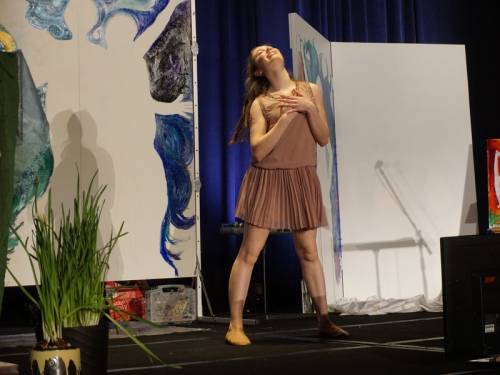Reconnecting the body with the mind
By Cláudio Carvalhaes | Presbyterians Today
This article is reprinted from the February/March 2018 issue of Presbyterians Today

Liturgical dancer, Erin Williams, sharing her gifts. Emily Enders Odom
Why do we so often misunderstand our spirituality? As Presbyterians, we tend to live in our heads as if our bodies were disconnected from our intellectual faith. Our worship is mostly related to what we think and less on how we move. For example, if we see someone dancing in our worship service, we tend to see it as an improper way of worshiping God. I am not advocating for irrationality but rather, to have us think as well as feel, dance, smell, taste and touch, as ways of developing our spirituality.
Perhaps our spirituality is too often constrained by what we understand the sacred is all about. If we understand the sacred as that which is quiet, calm, decent and ordered, and if our spirituality is marked mostly by organ music rather than drums, then we have already limited expression of the holy. Some churches have added to their worship services drums, guitars and dance, offering other ways of expressing the movement of the Holy Spirit that are louder and more festive.
Still, in many U.S. Presbyterian churches, why is it that our bodies don’t matter much? Why do we expect worship to be mostly a rational enterprise? Some say this comes from our heritage, which is marked by European culture. Historians, though, remind us that our Presbyterian forebears were much more likely to dance, cry or clap in their worship services. The truth is, contemporary Presbyterian worship is much less lively than in previous times. But Presbyterians who worship in other parts of the world are more inclined to feelings and movements of the body.
Presbyterians believe that the work of the Holy Spirit is fundamental. Our lives are possible only by the movement of the Spirit in us, and we can worship only because we respond to God through the work of the Spirit in us. During the preaching of the Word, we can understand the preached Word only because of the testimony of the Holy Spirit in our hearts. At sacrament, it is the Holy Spirit who confirms the real presence of Jesus Christ for us. We walk by faith, and faith is a gift of the Spirit. Our sanctification is a work of the Spirit. We are empowered to live the full mission of God in the world with the graces, gifts and charisma of the Holy Spirit (Rom. 12:6–8; 1 Cor. 12:8–10; 1 Cor. 12:28; Eph. 4:11; 1 Peter 4:11). We are to develop the fruit of the Spirit (Gal. 5:22–23: love, joy, peace, patience, kindness, generosity, faithfulness, gentleness and self-control).
What we often forget, though, is that all of that happens in and through the movement of our bodies and not just intellectual discussion. Our challenge, then, is to reclaim our body in our spirituality. At the heart of our faith is the daring truth of incarnation: God made flesh. Jesus was a full and healthy human being. In him, sacredness became festive. His crying was a sign of his profound, compassionate spirituality. Eating with his disciples was both a spiritual and material activity. At his baptism, in his daily round, at the cross and at his resurrection, heaven and earth became one; immanence and transcendence found a common place in him.
If we live the fullness of Jesus Christ in our bodies, we can challenge not only our tradition and our worship, but also the whole world. In this incarnated spirituality, our care for the soul, the mind, the heart and the body is the care of ourselves and every human being. Thus, to care about or for the bodies of the immigrant and the refugee is to be profoundly spiritual. In this incarnated spirituality, our bodies are fully connected with all creation, so to deeply care for the earth is to deeply care for our eco-spirituality. Our bodies are the temple of the Holy Spirit — fully connected, fully human and fully spiritual.
The Rev. Dr. Cláudio Carvalhaes is the associate professor of worship at Union Theological Seminary in New York City. He is the author of Eucharist and Globalization: Redrawing the Borders of Eucharistic Hospitality. His newest book, Preaching and Liberation Theology: Metaphors for Our Time, is scheduled for publication in 2018.
![]() You may freely reuse and distribute this article in its entirety for non-commercial purposes in any medium. Please include author attribution, photography credits, and a link to the original article. This work is licensed under a Creative Commons Attribution-NonCommercial-NoDeratives 4.0 International License.
You may freely reuse and distribute this article in its entirety for non-commercial purposes in any medium. Please include author attribution, photography credits, and a link to the original article. This work is licensed under a Creative Commons Attribution-NonCommercial-NoDeratives 4.0 International License.
Categories: Faith & Worship, Presbyterians Today
Tags: body, dance, drums, faith, guitar, music, sacred, soul, spirituality, worship
Ministries: Presbyterians Today